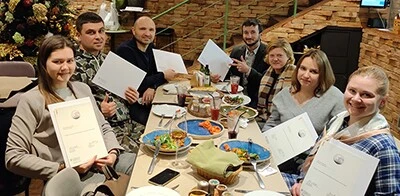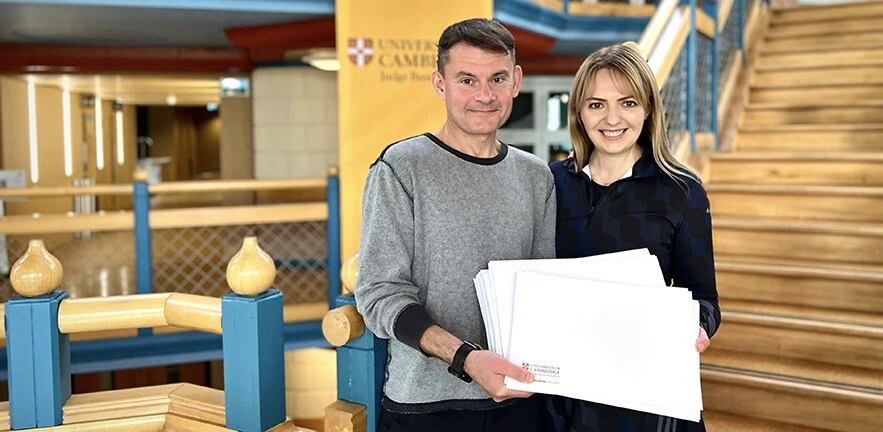A native of Ukraine, Professor Andrei Kirilenko spent 12 years fighting financial crises around the world for the International Monetary Fund, and then worked as a financial regulator in the US in the aftermath of the global financial crisis. But he says he has “never worked harder” than when leading an Executive Education programme at Cambridge Judge Business School to help the National Bank of Ukraine rebuild the war-torn country’s financial sector.
“I’m honoured to be involved, and am very deeply emotionally attached to the programme and the people,” says Andrei, Professor of Finance at Cambridge Judge, who lost his 85-year-old mother in Russia’s invasion of his hometown of Mariupol.
Building a sanctuary through a stronger financial sector
“I want them to build a sanctuary – for the Ukrainians and their culture and civilisation. For that, Ukraine needs to rebuild its financial sector and to become a wealthy nation, because by being wealthy you can defend your independence. Then you don’t have to go empty-handed and ask the rest of the world for help.”
The idea of the Ukrainian course, which later involved 50 financial market visionaries, was born in Kyiv during the shelling.
“When the war started, I had just started my fintech Executive Education programme at Cambridge Judge Business School and completed my assignments from bomb shelters,” says Kate Shcheglova-Goldfinch, senior project manager at the National Bank of Ukraine (NBU) on the fintech market, digital technologies and regulatory platforms development.
“Performing the visionary tasks, I thought: ‘It would be very cool if there was an opportunity for Ukrainian financiers to get together and brainstorm about the future of Ukraine in the post-war period, to think about scenarios for reviving the economy and developing the financial sector’. At that time, I did not know that in 3 months I would already be discussing the structure of the future Ukrainian Executive Education programme with the Business School Dean and leading professors.”
“It is worth saying that I was already engaged in the creation of academic programs with Ukrainian universities in the context of my work at the NBU as an external consultant responsible for fintech. Cooperation with the academic sector has become an element of the fintech-2025 strategy of the National Bank of Ukraine. I am grateful to the NBU team for the unprecedented support of the partnership with Cambridge Judge Business School, despite the very difficult conditions associated with maintaining the financial stability of the financial sector during the war. However, even in such a difficult time, the development of innovations and interaction with the market, financial literacy and strategic development remain among the regulator’s priorities.”
Support of academic initiatives crucial to Ukraine’s fintech strategy
“The war in Ukraine poses new challenges to the financial market, and for the National Bank of Ukraine it is a field for in-depth assessment and development of new approaches to allow financial stability to be maintained while keeping pace with innovation,” says Oleksii Shaban, Deputy Governor of the NBU.
“The support of academic initiatives is a key element of the fintech strategy of Ukraine-2025, and the programme for financial market participants with an emphasis on economic empowerment and the progressive development of the financial market in wartime plays a very important role. We are happy to move forward with such reputable academic partners as Cambridge Judge Business School and are confident in a long-term partnership that will help Ukraine, no matter what, to move towards progress and innovation, remaining a stable, prosperous market and economy.”

With the support of the Cambridge Judge Dean, Professor Mauro Guillén, the programme provided an overview of modern digital technologies, Fintech, and global trends presented by 5 faculty members and 20 outside speakers and professional consultants. The programme consisted of modules in which participants: deep-dived into digital trends in the financial sector; discussed the role of ESG; learned the opportunities and challenges of Big Data and approaches to its protection; have given much attention to behavioural and social change. In the last 2 modules, listeners studied design-thinking techniques and, based on them, the teams created a strategic vision for the future development of the Ukrainian financial sector. All modules included a lecture and discussion part: during the discussions global trends were superimposed on Ukrainian realities and market visionaries, who together with the programme participants were looking for insights into the Ukrainian economy and society revival.
The programme was offered free of charge. In lieu of payment, participants raised £13,000 for the Armed Forces of Ukraine. The collected funds were directed to purchase equipment for military units and sent to the front line.
Strategy developed on the programme presented to key stakeholders
“The idea was to involve all of the visionaries and leading people from the financial sector in Ukraine in this programme,” says Kate. “We aimed to create brainstorming sessions with leading Ukrainian experts, to reap the benefits of global trends, and to determine how we can adapt them to the reality of the war in Ukraine. Some parts of the country have been completely destroyed – no houses, no infrastructure, no payment terminals, no internet – but other parts of Ukraine are totally digitalised and becoming more resilient. It’s a matter of how we join these 2 worlds.”
The course began in July and was supported by Mastercard Ukraine and Deloitte in Ukraine. Participants started together and then were split into 5 working groups, each of which developed a vision for rebuilding the financial sector in Ukraine. These visions were then combined into one overall strategic document which was presented to representatives from key stakeholders such as the National Bank of Ukraine, the Ministry of Digital Transformation of Ukraine, the National Securities and Stock Markets Commission, and the European Bank for Reconstruction and Development.
Training for life after the war
“The course is a unique platform of interaction for ecosystem participants,” says Natalya Petrova, a programme participant who is a Project Manager at the Office of Economic Growth, USAID Ukraine. “It is incredibly valuable during wartime, when it brings together like-minded professionals inspired to develop professionally and contribute to Ukraine’s recovery and reconstruction.”
“This dialogue is different from peacetime since the chain is broken – and this enables us to see and learn the applications of technology, find the right fit for them in the financial sector, and see where the world is going, where Ukraine fits, and to identify potential growth points.”
Sustainability to play a central future role
“Hard times, warm hearts. Those words come to mind while thinking about our people – about Ukrainians. Our aim was to build a strategy and some basic guidelines for the rebuilding of Ukraine by strengthening its main vein – the financial system,” says another course participant, Stefanii Dzhenkov, Product Coordinator at Wirex, a fintech platform. “Cambridge Judge Business School provided us with the best training possible: opportunities, knowledge, and the centuries-old experience of Cambridge University. Thanks to this combination of factors, we as Ukrainians did our best. We used the instruments provided, our knowledge, and brainstormed, built, and presented insightful ideas for the Ukrainian future, for Ukrainian growth, for Ukrainian rebuilding.”
As well as focusing on the country’s financial sector, environmental, social and governance (ESG) policies featured heavily on the programme as Ukrainians look for sustainable ways to rebuild the country once the war ends, and to use society-based projects to re-integrate traumatised families and veterans returning from the war.
“There are blackouts almost every week, and the environmental aspect is much easier to communicate as part of our energy independence from a centralised infrastructure,” says course participant Olena Kuzmichova, CEO of firm Self-ERP. “We are fighting for the social aspect. Moreover, there is a lot to do in the governance aspect. We should encode ESG aspects in our plan for Ukrainian renovation.”
The role of virtual assets in Ukrainian rebuilding?
It’s unknown what further damage Ukraine will suffer, but the cost of rebuilding will be staggering – estimated at multiples of pre-war GDP – and it’s unlikely the existing financial framework will be able to cope. “Cryptocurrencies are already proving vital in the daily lives of Ukrainians, enabling them to pay for supplies for soldiers and medicine for children, and will continue to be crucial in the future,” says Andrei Kirilenko.
Although the Executive Education programme at Cambridge Judge Business School has finished, strategic priorities discussed and developed on it are being implemented. Last month, the National Bank of Ukraine presented to the public a detailed concept for e-Hryvnya, a central bank digital currency, which was discussed in draft form on the programme.
Several programme participants, along with Professor Kirilenko, have joined an advisory group on virtual assets created by the National Securities and Stock Markets Commission (NSSNC) of Ukraine, its regulator of securities markets. The advisory group is led by Yuri Boyko, the NSSMC Commissioner, who himself participated in the programme, and they are currently discussing the legal and regulatory agenda regarding virtual assets. “I would like to run the next iteration of the programme at Cambridge Judge for Ukraine,” Andrei Kirilenko says. “But it needs to be financially supported to make it viable. Cambridge Judge Business School is currently hosting a displaced Ukrainian academic and a PhD student. We are doing what we can to help – they are part of our Cambridge family.”


